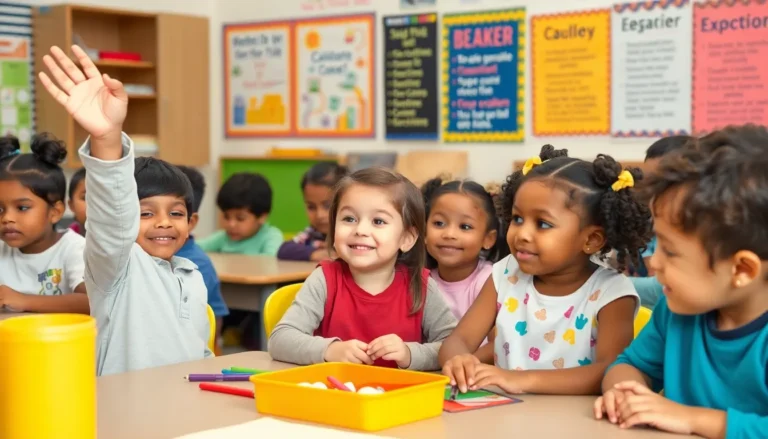Table of Contents
ToggleWhen it comes to parenting or managing a team, the word “discipline” often raises eyebrows and conjures up images of stern faces and time-outs. But what if discipline could be more like a dance party than a detention hall? Effective disciplinary methods can transform chaos into harmony, turning missteps into teachable moments.
Overview of Disciplinary Methods
Disciplinary methods encompass a range of strategies aimed at correcting behavior and promoting positive development. These techniques can vary significantly based on the age of the individual and the environment, whether that be a home or a workplace.
Positive reinforcement stands as one effective method, encouraging desired behaviors by rewarding individuals for their good actions. This technique fosters a supportive atmosphere where accomplishments are acknowledged, leading to increased motivation.
Natural consequences typically demonstrate real-world results of actions, helping individuals learn accountability. For example, if a child neglects their homework, they might face consequences at school, leading them to understand the importance of responsibility.
Setting boundaries and clear expectations is crucial for effective discipline. Clear guidelines reveal acceptable behaviors, promoting consistency and helping individuals understand what is expected of them.
Time-out as a method allows individuals to calm down and reflect on their actions. It provides a moment of pause, giving them an opportunity to consider their choices without immediate emotional responses.
Restorative practices focus on repairing relationships and restoring harmony after conflicts. These strategies encourage dialogue about the impact of one’s actions, allowing individuals to express feelings and work towards reconciliation.
Utilizing a combination of these methods fosters an adaptable approach to discipline. Each strategy offers unique benefits and can be tailored to suit specific situations. Engaging in these practices can transform discipline from a punitive measure into a constructive opportunity for growth.
Types of Disciplinary Methods

Disciplinary methods play a crucial role in shaping behavior and fostering a positive environment. Understanding the different types aids in selecting the most effective approach for various situations.
Positive Reinforcement
Positive reinforcement involves acknowledging and rewarding desirable behaviors. Encouragement comes in different forms, such as verbal praise, tangible rewards, or additional privileges. For instance, when children complete their homework, a parent may offer a small treat or extra playtime. This approach not only motivates individuals to repeat good behaviors but also cultivates a supportive atmosphere. Research indicates that consistent use of positive reinforcement strengthens the desired behaviors over time. Equally important is the immediate reward following the behavior, which helps reinforce the connection between the action and the positive feedback.
Punitive Measures
Punitive measures aim to discourage unwanted behavior through consequences. These consequences can include loss of privileges, grounding, or other forms of disciplinary action. For example, a teenager may lose access to a favorite video game after breaking house rules. While punitive measures may yield quick compliance, they often lack long-term effectiveness. Many experts argue that focusing solely on punishment fails to promote understanding or behavioral change. Instead, punitive measures can nurture resentment or withdrawal, undermining the overall relationship. Therefore, combining punitive actions with constructive methods often results in more meaningful behavior modification.
Effectiveness of Disciplinary Methods
Disciplinary methods play a critical role in shaping behavior, impacting both individuals and groups. Their effectiveness varies based on implementation and follow-up.
Short-Term Impact
Disciplinary methods often produce immediate results by addressing unwanted behaviors swiftly. For instance, positive reinforcement can lead to enhanced motivation and compliance within days. Conversely, punitive measures may achieve quick compliance, but they seldom foster genuine understanding or respect. Immediate consequences remind individuals of expectations and foster accountability. In structured environments, appropriate methods can quickly transform behaviors, promoting a sense of order.
Long-Term Consequences
Long-term effectiveness emerges from consistent application of constructive disciplinary methods. Positive reinforcement strengthens desirable behaviors over time, creating a cycle of encouragement and growth. Individuals who experience natural consequences tend to develop a deeper understanding of accountability, minimizing future infractions. Conversely, reliance on punitive measures often breeds resentment and disengagement, leading to repeated behavioral issues. Emphasizing personal growth and relationship building fosters lasting behavioral changes. Ultimately, creating a supportive atmosphere leads to improved dynamics in parenting and team management.
Ethical Considerations
Effective disciplinary methods incorporate ethical considerations, which play a crucial role in fostering positive environments. Respect for individual dignity must remain paramount during any disciplinary approach. Acknowledging the importance of fairness ensures that methods applied are consistent for everyone involved.
Using positive reinforcement supports ethical discipline by validating good behavior through recognition and rewards. Encouraging desired behaviors builds a culture of respect, making individuals feel valued. Natural consequences offer another ethical avenue, allowing individuals to learn accountability through real-life experiences. This method entices self-reflection and personal responsibility.
Promoting clear boundaries aligns with ethical considerations in discipline. Specific guidelines help set expectations while ensuring everyone understands what behaviors are acceptable. Transparency in communicating these boundaries nurtures trust and fairness.
Restorative practices call for ethical engagement by emphasizing dialogue and reconciliation. These methods repair relationships after conflicts, creating a sense of community. Engaging in open conversations allows for understanding diverse perspectives, strengthening interpersonal connections.
Utilizing punitive measures, though sometimes seen as necessary, raises ethical concerns. Consequences like loss of privileges can lead to resentment rather than understanding. Building an ethical framework for discipline discourages reliance solely on punitive actions, prompting a balance that supports growth.
Prioritizing ethical considerations transforms discipline from a punitive exercise into a constructive opportunity. Fostering an atmosphere where respect and understanding thrive promotes lasting positive changes in behavior. Embracing these practices leads to healthier dynamics in parenting and team management settings.
Cultural Perspectives on Disciplinary Methods
Cultural contexts significantly shape disciplinary methods and their effectiveness. Different societies exhibit unique approaches, often reflecting their values, beliefs, and historical backgrounds. In many Asian cultures, for instance, filial piety emphasizes respect for authority, leading to a preference for strict, authoritative discipline. Adults in these communities often view obedience as a key virtue, influencing how discipline is administered.
Conversely, Western cultures frequently lean toward more egalitarian methods. In these societies, fostering open communication and collaboration between children and parents or team members becomes a priority. This approach encourages dialogue and understanding, focusing on fostering positive relationships rather than on punishment. Scandinavian countries exemplify this trend, where non-punitive measures are favored and negative reinforcement is often avoided.
Religious and philosophical beliefs also shape perspectives. For instance, in some religious teachings, love and compassion guide disciplinary actions, emphasizing forgiveness over punishment. These beliefs encourage restorative practices aimed at repairing relationships rather than applying punitive measures—which can lead to resentment.
Educational institutions may also adapt disciplinary methods based on cultural expectations. Progressive schools in the US often prioritize positive reinforcement, creating an environment that nurtures a child’s self-esteem and accountability. This contrasts with more traditional schools, where strict discipline and structured environments are the norms.
Lastly, globalization influences these perspectives. Exposure to diverse cultures encourages individuals to reevaluate their disciplinary practices. This cross-cultural exchange allows for the adaptation of successful methods from various traditions, leading to a more comprehensive understanding of effective discipline.
Disciplinary methods play a crucial role in shaping behavior and fostering growth. By adopting a balanced approach that prioritizes positive reinforcement and natural consequences, individuals can create an environment that encourages accountability and understanding.
The emphasis on ethical considerations ensures that discipline remains respectful and constructive, paving the way for healthier relationships in both parenting and team dynamics. As cultural contexts continue to evolve, so too should the strategies employed, allowing for a more nuanced understanding of effective discipline.
Ultimately, viewing discipline as an opportunity for learning rather than punishment can lead to lasting positive changes in behavior and strengthen the bonds within families and teams.





